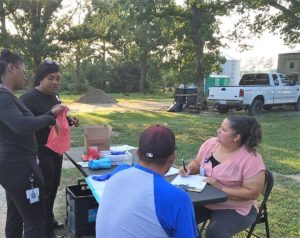
This summer, for National Farmworker Health Day (part of National Health Center Week) the farmworker outreach team at Rural Health Group tried something new. With one of their behavioral health therapists and their HIV team they visited one of their local farmworker camps to offer depression and HIV screenings to workers. 16 farmworkers (of the 17 who were present) participated in rapid-HIV screenings and 15 in depression screenings. Outreach worker Nahu Palacios interpreted for Phil Hinman, LCSW, a behavioral health therapist who has been at Rural Health Group for two years and has an interest in serving underserved populations.
This was the first time that Mr. Hinman had been to one of the farmworker camps and he was struck by their housing conditions (an old home, many men living in the same home, the lack of privacy), the long hours they worked, and their lack of access to transportation.
He shared some of his impressions with NCFHP:
“One thing that is very evident to me is that this population is very underserved. My concern is that the farmworkers don’t come for help until the wheels are falling off.
There is a lot of trauma because of the environment that they have come from. When you see the challenges they have faced, you have a whole new level of respect.”
Outreach coordinator Ricardo Garcia said they were surprised by the level of sadness that they found: “It is a group of people who seem happy every time we visit them” but when they took part in the depression screen, most of the men said they “felt like failures to themselves or family members. Coming over to US to provide for their family members, they are not able to be with them. They have to be so far away from their families – they don’t get to see their kids growing up…”
The farmworkers the team visited that night talked about the challenges they faced – the isolation, the long work hours, and overexposure to nicotine when working with tobacco that made it hard to sleep. Mr. Hinman noted the fact that this was not an environment where the men got to talk much about depression or anxiety. This was a chance for them to open up and get confirmation that what they are feeling is normal and know where they can seek help.
Research shows extremely high rates of depression and anxiety among NC farmworkers, with a prevalence over 50% in one study1. Other studies suggest that geographic isolation, difficult working conditions, crowded living environments and separation from family place farmworkers at greater risk for stress, depression and anxiety2. While many farmworkers have developed coping skills, they and their family members are vulnerable to mental health issues which go unaddressed by existing services. There are very few bilingual behavioral health providers in NC. Hours of operation, lack of familiarity with services, and lack of transportation are additional challenges.
“We have a population that isn’t getting what it needs,” said Mr. Hinman. “I think everybody needs to be cared for, it is just my philosophy. Rural Health Group gives a framework that makes that easy. Most of who we serve are unserved or underserved.”
Mr. Hinman, Mr. Garcia and the rest of the farmworker team at Rural Health Group, along with NCFHP, are exploring ways to continue providing behavioral health care to farmworkers on a more regular basis.
As Mr. Garcia emphasized, “We need to break the stigma around behavioral health.”
1 Crain, R.; Grzywacz, J.G.; Schwantes, M.; Isom, S.; Quandt, T.A.; Arcury, T.A. Correlates of mental health among Latino farmworkers in North Carolina. J. Rural Health 2012, 28, 277–285.
2 Grzywacz, J.G.; Chatterjee, A.B.; Quandt, S.A.; Talton, J.W.; Chen, H.; Weir, M.; Arcury, T.A. Depressive symptoms and sleepiness among Latino farmworkers in eastern North Carolina. J. Agromed. 2011, 16, 251–260.